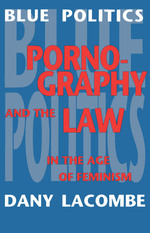
Dany Lacombe documents the emergence of a feminist definition of pornography, analyses the impact this definition had on the debate between conservative and civil libertarian organizations, and identifies the emergence of groups who strongly resisted the attempt to reform the law: feminists against censorship and sex radicals. Finally, she examines the way in which institutional practices are shaped by and yet shape the power relations between groups. The emphasis is on the way such power relatins are embodied in the policy-making process.
Drawing on Michel Foucault’s concept of power/knowledge, ‘ Lacombe reveals how the process to criminalize pornography inaugurated a controversial politics that produced collective identities and transformed power relations. She shows law reform as a strategy that both constrains and enables action.